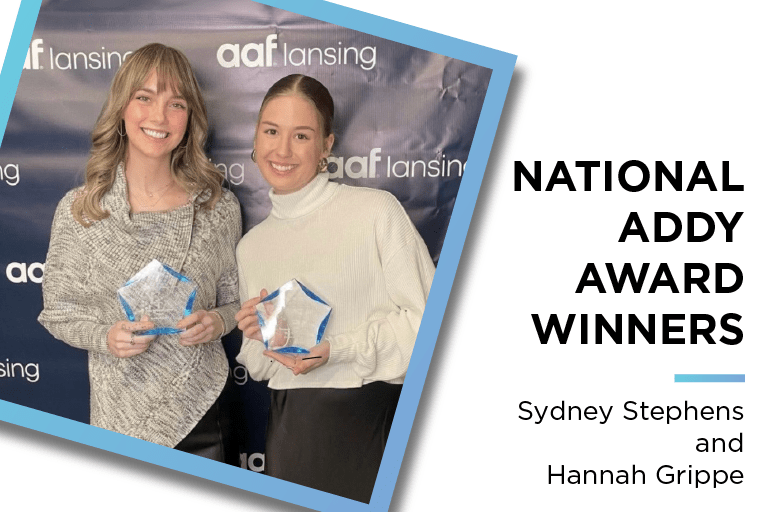A student advertising campaign that aims to set the record straight about the bias towards the killing of Black people in America has earned national recognition.
The project, entitled “Biased Towards the Truth,” is the work of incoming seniors Sydney Stephens and Hannah Grippe. Their entry earned a national Mosaic ADDY award for its themes of diversity, equity and inclusion, and a Silver ADDY award for art direction. The awards were presented the American Advertising Federation during its annual national gala held May 31 in Salt Lake City.
Stephens, who’s majoring in advertising and journalism, says “Biased Towards the Truth” speaks to the mistrust of the mass media and the lack of integrity in reporting.
“Oftentimes, with most publications, we see that they serve people in power,” Stephens said. “With this campaign, it was important to create a message that said although we may be biased liberally, we still report the truth. Journalists have an obligation to report accurate information, and from there the people decide what they want to believe.”
The campaign includes a series of images focusing on highly publicized incidents of police brutality. Accompanying text relays stark numbers about the details of each event. Jagged lines streak across each image, giving the impression of torn paper.
The first image is about Breonna Taylor, the 26-year-old Black woman who was shot and killed by police as she slept in her Louisville, Kentucky apartment in March 2020.
“I think that's the one that I'm most proud of, because to me it's the most impactful,” Stephens said. “It sets the tone for the rest of the campaign. There’s also one about George Floyd. Then I also have one image that’s about the general statistics of police brutality. Thousands of Black citizens are killed every year, but then only a dozen or so police officers. So, it brings up the question: why is there so much police brutality around this certain race?”
Ross Chowles, professor of practice in Advertising and Public Relations, is Stephens’ instructor. He believes the best ads are those that talk to the viewer on a human level.
“Obviously, this (one) does in a country that’s absolutely divided,” said Chowles. “A lot of people say there’s an intent by the police to eradicate (Black people). Others would say, no, no. I think that’s why it’s such a powerful campaign. It’s connecting to an issue and stirs emotions.”
Stephens had come up with the initial copywriting. However, the project needed a strong art designer to bring the message home. Enter Hannah Grippe, who’s majoring in creative advertising and advertising management.
“Ross teamed us up and pooled our strengths together to create something awesome,” Grippe said. “Sydney had these really powerful words, but we needed a creative way to link them with more emotion. So, my idea was to take her original images from the Washington Post and then put a face with those facts.”
Grippe added the torn, slashed layers atop the photo background to convey a sense of trauma and urgency. Grippe wanted to slice through her viewers’ feelings of apathy.
“Everyone is so desensitized by the media these days,” she said. “With Black Lives Matter and what’s happening in Gaza, you’re seeing all these videos that are so violent and horrible, but you see them so many times that they’re not going to affect you as much. So, an important factor that came into my design process was, how do we break through this desensitization?”
Emboldened by their national ADDY, Sydney Stephens and Hannah Grippe are eager to embark on their futures. This fall, Stephens will serve as the next president of the MSU Advertising Association. She’s also writing a screenplay focused on the effects of guns on the human body. Stephens hopes it will inspire positive legislative action.
“It’s important to me to combine my love for advertising with the humanity of journalism,” Stephens said.
Grippe is currently working on an exhibition for the Traverse Bay Child Advocacy Center that calls attention to child sexual abuse. She says her ADDY win has given her more confidence and motivation to push the boundaries of her work.
“And I’ve found that as I work on these projects, I’m leaning more towards those really important things that get kind of pushed under the rug and not everyone is talking about it,” Grippe said. “I’ve definitely found a love for speaking about topics that some people are too afraid or not confident enough to talk about.”
By: Kevin Lavery
